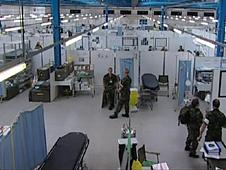War training in mock Camp Bastion
- Published
A young man in desert fatigues is rushed from an ambulance to resus on a stretcher. His left arm is hanging off, the devastating blow from a rocket-propelled grenade.
But all is not what it seems - this is a training exercise. The patient is an actor and the blood is makeup.
A warehouse in Strensall, York, has been transformed into Camp Bastion in Afghanistan.
Teamwork
Over three days the Manchester Field Hospital, made up of 140 regular army and reservist medical staff, will work together on different trauma scenarios.
It helps them to prepare for the challenges they will face in Helmand later this year.
"This exercise brings together 30 different units that will all be working together in Camp Bastion. It emphasises team building," says Major Ellie Hytch, who plans the clinical exercise at the centre.
She continues: "It provides specific detail of what life will be like, which will be different from their routine NHS environments. It is a dress rehearsal before getting out on the ground."
Just like the real thing
To make it as realistic as possible injuries based on true cases are used. Behind the scenes makeup and prosthetic teams are at work making wounds look as genuine as possible.
"Because the injuries are so specific to the current conflict I use photographs as a reference as well as very detailed accounts from those who have been injured and from medical professionals who treated them," says Linzi Foxcroft, the lady behind Trauma FX, a company that provides casualty simulation.
She is checks on her team that are making-up four casualties for the next scenario - one has shoulder wound, another has a piece of shrapnel embedded in his arm.
The actors are thoroughly briefed to present with the correct identification and what their symptoms are.
Amputee actors
Linzi continues: "Some are actors or volunteers from the military. Others are from a company that provide non-English actors who play civilians, the local population. A few are genuine amputees. This allows us to create very realistic injuries."
Olaf Jones is one of these actors. He previously served with the Royal Air Force for 20 years and lost his arm during an Isle of Man TT motor race accident in 1997.
"Guys and girls from deployment overseas have come back and said thank you for what you did - it actually helped us save lives. We were in situations just like the ones with you in training," he says.
With limb loss defining the injuries sustained during the war in Afghanistan, the demand for surgical specialism has changed.
Changing injuries

x-ray, theatre, ICU, the layout of the training exercise mimics Camp Bastion
"Teams have become more experienced in the management of severe hand and upper arm injuries," says senior orthopaedic surgeon Col Mike Stewart.
"One of the hardest decisions a surgeon has to make in war is to remove an arm. For men who have lost both their legs - an arm is crucial for their rehabilitation and use of crutches."
For many of those going out to Afghanistan for the first time, it will be the biggest test of their lives.
"No matter how well you are trained, there is still a degree of anxiety, but that anxiety has definitely been reduced by the practise this exercise provides.
"Surgical experience is advanced though war. It will be the pinnacle of my career," says Surgeon Commander John Corson.
Manchester Field Hospital heads out to Afghanistan in October.
This piece is the start of a three part 'Medical Drama' series looking at where health and drama are combined
- Published17 June 2010